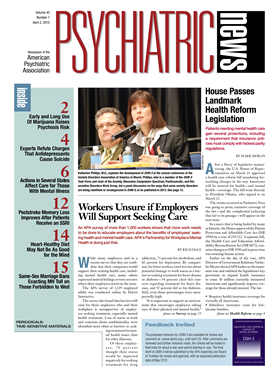Life is tough enough, but it's hard to be a minority within a minority, which is why Angela Neal-Barnett, Ph.D., studies African-American professional women.
Neal-Barnett reported on her ongoing NIMH-funded study of anxiety and fear among African-American women at the annual conference of the Anxiety Disorders Association of America in Baltimore in March.
Black women in America have been buffeted and constrained by multiple, often contradictory stereotypes, said Neal-Barnett, an associate professor of psychology at Kent State University in Kent, Ohio.
“Most of all, they are seen—and often see themselves—as the strong black woman who can do everything,” she said. She cited several cinematic examples of black characters who function as the white leading lady's best friend or caretaker.
In other words, they are supposed to “keep on keepin' on, to tend, mend, befriend, and take it.”
Trying to live up to or overcome those stereotypes can lead to plenty of stress and anxiety, she said.
“Anxiety disorders are among the most highly prevalent mental disorders affecting millions of Americans, and women of African descent, including professional women, are not exempt,” agreed Annelle Primm, M.D., M.P.H., APA's deputy medical director and director of the Office of Minority and National Affairs, in an interview. “In fact, researchers have pointed out that anxiety disorders are undiagnosed among African Americans to a greater extent than is depression.”
Living up to the stereotypic ideal can cause anxiety that can't be expressed easily because it would violate the ideal.
“They feel that they are the only ones experiencing this,” said Neal-Barnett.
To overcome that feeling, she has been testing “Sister Circles,” discussion groups that fall somewhere between group therapy and encounters in social settings familiar to the black community.
Such semiformal groups can at least partially compensate for the paucity of black mental health professionals, provide an option for people who are not at the threshold of mental illness, or help those who avoid care because of stigma or the feeling that they are “not sick enough.”
The research covers four circles of five to 10 women who meet for five sessions, 60 to 90 minutes long, in community settings like churches or public libraries. Neal-Barnett has run other circles as a consultant.
When the women were invited to join one of these circles, they often didn't think they were anxious. They might report somaticized complaints but needed some psychoeducation to know about anxiety and put it into words. The circles provided them with a language and a setting to express the issues that they felt.
At the start, they wouldn't say “worry” or “anxious,” but they spoke of “nerves” or said their children were “driving them crazy,” said fellow researcher Masheena Martin, M.A., a graduate student at Kent State.
The group discussions first serve an educational function and then edge into a form of cognitive-behavioral therapy (CBT). That creates another challenge.
According to Neal-Barnett, CBT is often confused by many African Americans with behavior modification and thus seen as part of a system used in jails and schools to control blacks. “Experts” in the black community or on television don't talk much about CBT either, she said.
“Others incorporate principles of CBT in their approaches but call it something else,” she said. “So you have to present it in ways that mesh with their own background and lives.”
Looking for a culturally relevant CBT exercise for the women, Neal-Barnett asked them to pick a favorite popular or gospel song, then rewrite the lyrics to articulate their worries and encourage themselves in moments of stress.
“The music speaks to them,” she said. “Use a song to push out negative thoughts, and you've begun to teach them cognitive restructuring.”
The Sister Circles may work to prevent anxiety as well as to treat it, said Neal-Barnett. She expects to publish her final results next summer.
“Dr. Neal-Barnett's work in health services research is to be applauded,” said Primm. “Through the use of the social support inherent in Sister Circles and creative adaptations of CBT, she has found a promising, culturally acceptable way to prevent and ameliorate anxiety in African-American women. We need more research of this nature, which translates science into customized approaches for specific population groups.”

